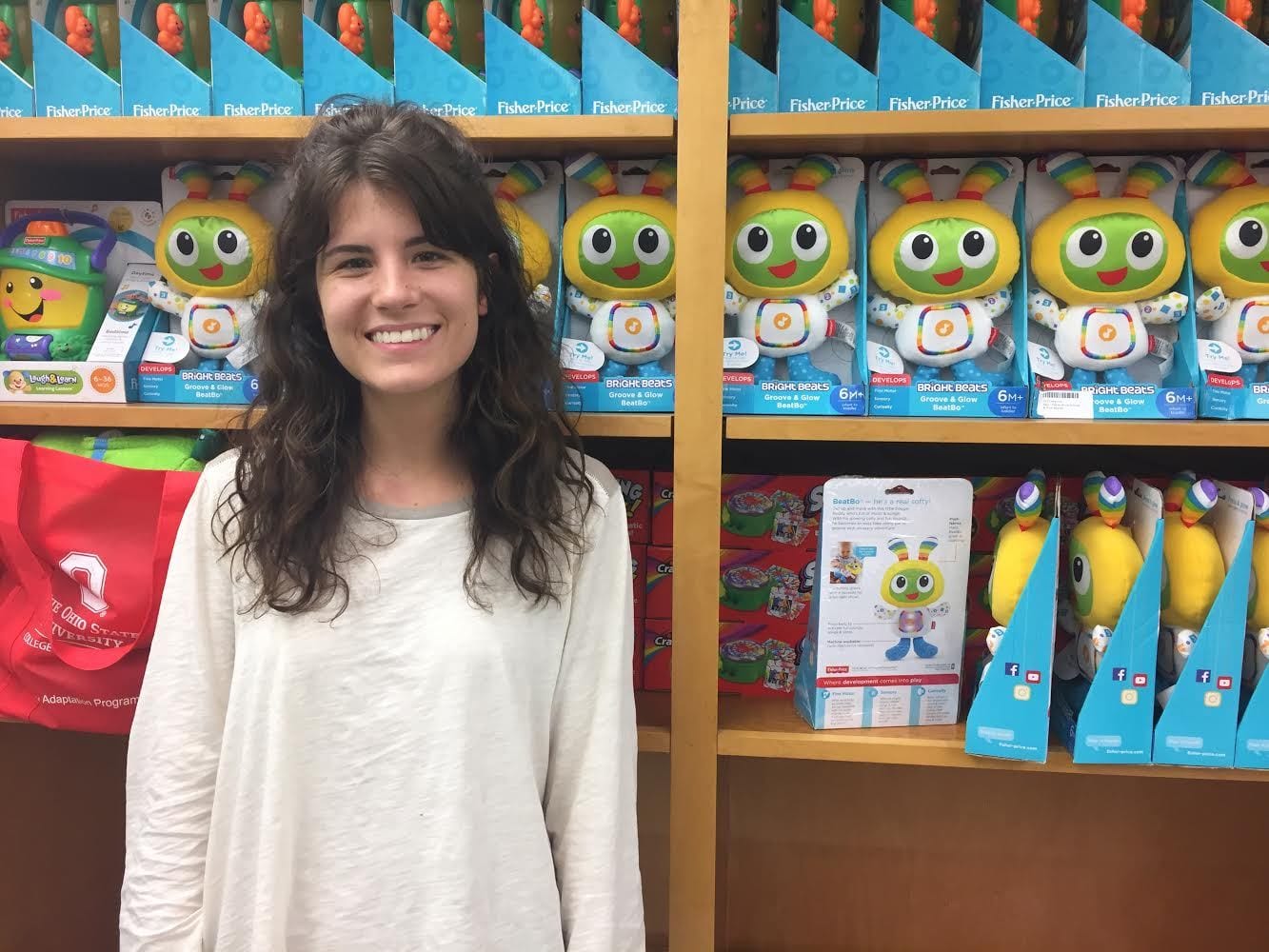
Sam Young, a second-year in public affairs and linguistics, poses with toys that are used as part of the Toy Adaptation Program. TAP modifies store-bought toys so they can be used by mentally disabled children.
For Sam Young, a second-year in public affairs and linguistics, the Toy Adaptation Program was one of the reasons she was drawn to Ohio State.
“I have people in my family who are developmentally disabled, and that’s always been a soft spot for me,” Young said. “To think that as part of the engineering experience, I could do something tangible to help people – that got me hooked.”
For children with disabilities, many mechanical toys can be difficult to operate. Mary Jo Wendling, who directs the Toy and Technology Library at the Nisonger Center, said that while modified toys exist, they can be hard to find and up to five times the cost of a conventional toy.
“These families often have many other expenses such as therapies, doctor’s visits, and additional equipment such as a wheelchair,” Wendling said. “So when you add purchasing toys through a specialty company, then it becomes cost-prohibitive for families to be able to buy many toys at all.”
Wendling explained that all children learn through playing, and “if you have a child who has physical disabilities such that they cannot independently access and play with toys, it impacts their ability to learn those skills that they would through play.”
When Young saw a video of Wendling explaining this concept in the fall of her freshman year, she was reminded of TAP, the program she heard about before coming to Ohio State. She started volunteering with the program and is now one of the four interns who research, run events and adapt toys.
It is impossible to adapt a toy in a way that makes it operational for every child, but TAP works as a bridge between toys and switches.
“We simply don’t know the impairment of the child, so some switches are a big button because they need a larger surface area,” Young said. “Some switches might even be eye tracking. If a child doesn’t have fine motor skills, there are head-turn switches. But the main adaptation we make is just a universal jack that will be compatible with lots of different switches.”
TAP has a list of toys it has been able to add this jack to, but it is always looking for more. Its members go to Target or Walmart and buy a battery-operated toy off the shelf and then bring it back to one of their open repair labs.
These labs are run by TAP’s interns and are open to all students. While engineering students in certain honors programs work with TAP as a requirement, many come as volunteers. About 20 students join the biweekly labs to fix previously adapted toys and explore possibilities for adapting new toys.
“One facet of TAP is to instill a sense of purpose in the engineering students through the labs,” Young said. “There isn’t a job where you can just adapt toys, but the principles that you have to apply are rooted in engineering and problem solving and circuitry. And it’s normally a draw for them to know that they can use their engineering powers for good.”
Even for non-engineering students like Young, being a part of TAP is an important lesson for her future career.
“It’s great because as a linguistics student, I’m really interested in teaching and I would love to take TAP somewhere it’s never been before. I’d love to be able to maintain my partnership with TAP if I ever teach abroad,” she said. “I see the possibility of bringing toy adaption wherever I’m teaching.”
As Wendling has observed students in TAP over the years, she has been impressed with how it changes the way they think about design and accessibility for everyone. As these students go into the workplace, she hopes they can make decisions that will eventually make a program like TAP unnecessary.
“I realize they are not going to graduate and build their professional career on adapting toys,” Wendling said.“What I do hope for them is that this gives them the ability to look at whatever it is their doing through a wider lens. And to realize the value of having things accessible and available from the beginning, rather than after-market modifications being made.”


